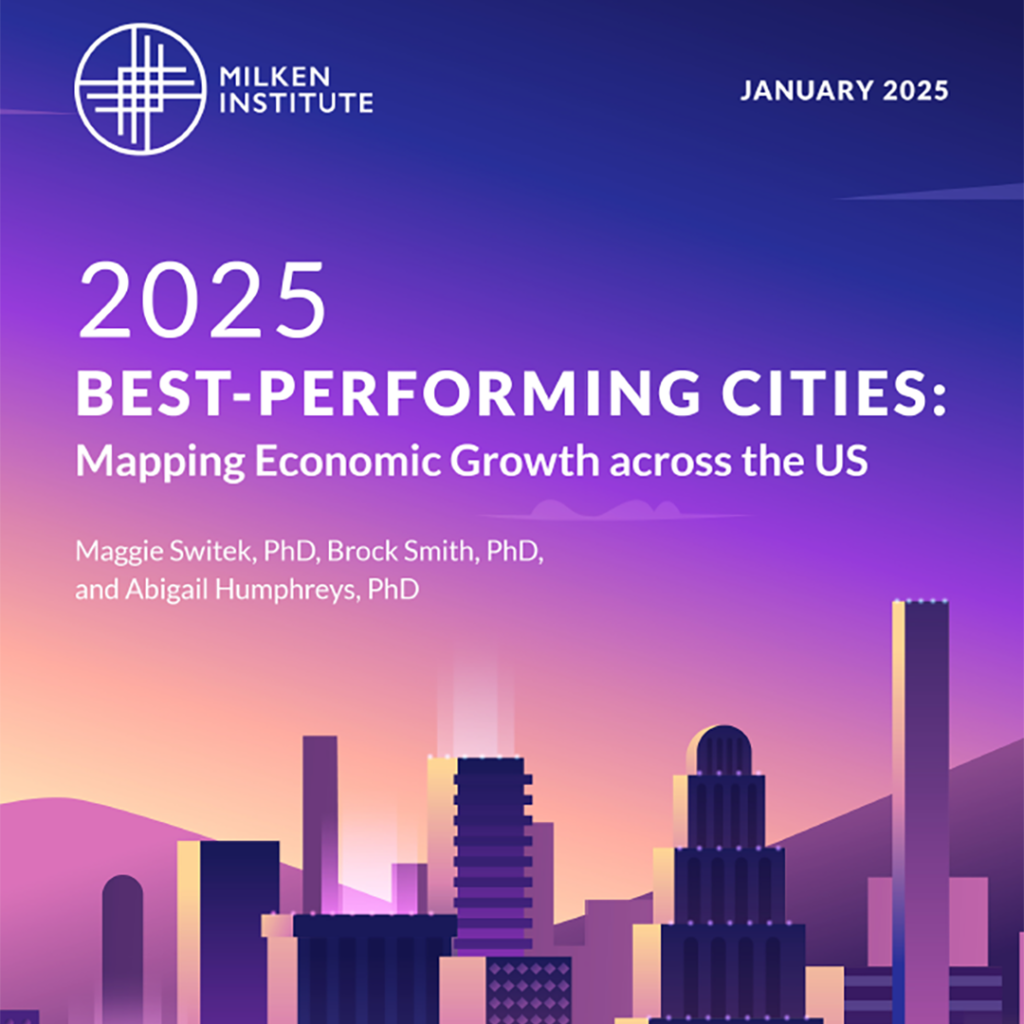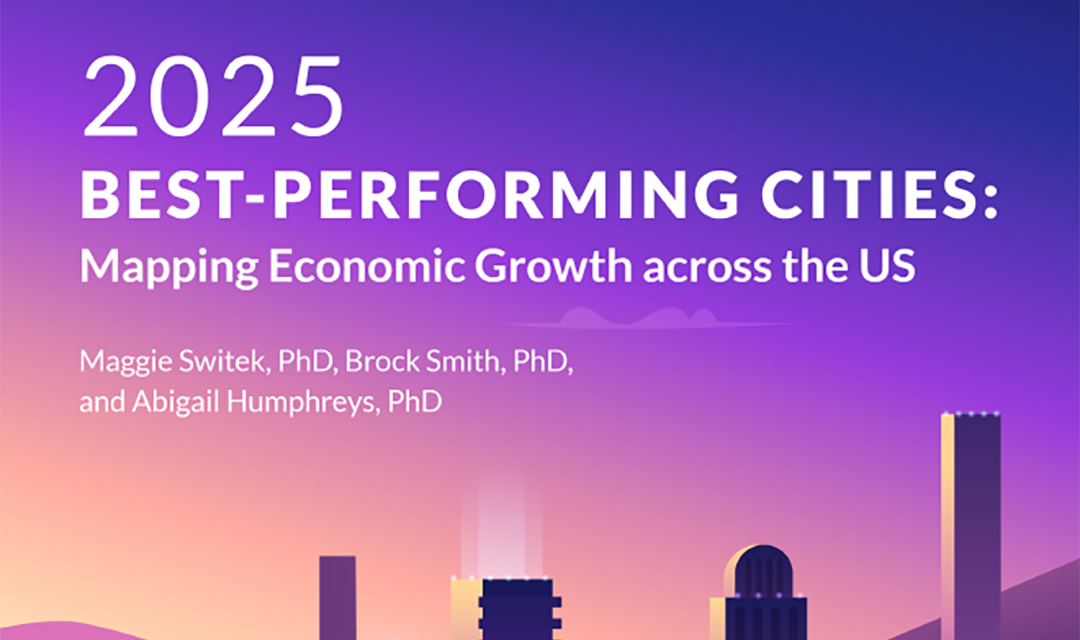The Memphis regional economy is in freefall.
At least that’s the opinion of the Milken Institute’s list of 2025 Best-Performing Cities, which measures MSA economies on the basis of 13 indicators. The yearly rankings by the Milken Institute – a nonpartisan, nonprofit organization – highlight U.S. cities with job growth, affordable housing, economic equality and other big draws.
Memphis TN-MS-AR has fallen on the way to #196 among the 200 largest U.S. cities.
Only Detroit-Dearborn-Livonia, Lafayette LA, Youngstown-Warren-Boardman OH-PA, and New Orleans-Metairie are ranked lower.

“The Best-Performing Cities index was designed to measure which U.S. metropolitan areas are most successful in terms of job creation and retention, the quality of jobs being produced, and overall economic performance,” the Milken Institute wrote. “Specifically, it pinpoints where jobs are being created and maintained, where wages and salaries are increasing, and where economies and businesses are growing and thriving.”
Moving Down
It’s been 13 years since the Memphis region was listed in the top 100 of the listing – at #99 – and now it’s almost bottomed out the list of 200.
Memphis has been falling since 2022 when it was #128. A year later, it was #135, and its ranking sank to #175 in 2024.
Meanwhile, Tennessee’s other metros rank significantly higher than Memphis but others show signs of economic concerns. The Nashville MSA is #20, down from #6 last year. Knoxville MSA is #69, down from #28. Chattanooga MSA is #47 and was #46. Clarksville MSA is #70, up from #95. Kingsport/Bristol MSA is #166, down #118.
Other comparable cities are Austin #6; Jacksonville #22; Charlotte #24; Indianapolis #39; Richmond #51; Oklahoma City #58; Atlanta #61; Little Rock #71; St. Louis #81; Tulsa #86; Kansas City #92; Louisville and Cincinnati #114; Newark #121; Birmingham #135; Pittsburgh #145; Baltimore #171; Cleveland #185; and Milwaukee #191.
The Top 10 MSAs on the list are Raleigh, Ogden UT, Salt Lake City, Huntsville, Colorado Springs, Austin, Fayette-Springdale-Rogers, Olympia WA, Palm Bay-Melbourne FL, Boise, Charleston SC, and Myrtle Beach.
Rankings by Category
The broad categories for the Milken Index are labor market performance, high-tech impact, and access to economic opportunities. The measurements under those three categories and determine cities’ rankings are jobs growth, wage growth, short-term job growth, high-tech GDP, high-tech concentration rank, LQ (high-tech location quotient) count rank, broadband access, housing affordability, resilient households, and Gini Index rank.
The ranking in each category:
#137 – Job Growth 2018-23
#199 – Job Growth 2022-23
#131 – Wage Growth 2018-23
#168 – Wage Growth 2022-23
#198 – Short-term Job Growth
#100 – High-Tech GDP 2018-23
#133 – High-Tech GDP 2022-23
#182 – High-Tech Concentration
#138 – LQ Count Rank
# 102 – Broadband Access Access 2024
# 137 – Housing Affordability
#174 -Resilient Households 2023
#157 – Gini Index
Memphis Metro’s Languishing Rankings
Here are the Memphis ranking in the Best-Performing Index by year:
#196 – 2025
#175 – 2024
#135 – 2023
#128 – 2022
#166 – 2021
#152 – 2020
#145 – 2018
#148 – 2017
#149 – 2016
#182 – 2015
#145 – 2014
#150 – 2013
#99 – 2012
#191 – 2011
Five Principles
After only breaking the top 100 once in 13 years, it seems a good time to revisit Brookings Institution’s five principles to create a higher growth economic trajectory by getting the markets and the civics right:
Set the right goals. Set long-term goals that go beyond traditional headline economic indicators to achieve more robust measures of regional growth, productivity, and inclusions while also setting shorter-term metrics to monitor progress.
Grow from within. Leaders in new approaches to economic development focus on strengthening assets that enable their distinctive industries to flourish and grow from within, rather than rely primarily on marketing to recruit individual firms from elsewhere.
Boost trade. Contemporary economic development leaders actively support and promote expert growth and trade with other markets in the U.S. and around the world to deepen their industry clusters and bring new resources and income into the region.
Invest in people and skills. The skills of workers and the level of human capital in a region are critical factors in determining the competitive position of firms and the path to growth, prosperity, and inclusion.
Connect place. The most forward-leaning leaders are harnessing regional markets and connecting local communities to them. Markets – industrial, labor, and housing – are regional but the people and assets that matter to markets are local.
The status quo falls short when it produces siloed, short-term gains, when it targets individual firms or the wrong sectors, and when it offers incentives and subsidies that benefit the few.
As Brookings has written: “Firms that take an incentive are not more likely to create jobs than those that move into a state or region without one. Defraying property tax obligations through vehicles such as tax increment financing to attract a firm or commercial development removes revenue from the tax base that could have supported schools, community policing, and other public services that matter to industry and workers. In general, the attention paid to firm attraction far outweighs the small portion of jobs that result from such moves.”
**
**
These commentaries are also posted on the Smart City Memphis Facebook page and on Instagram along with occasional articles, reports, and commentaries that are relevant to Memphis.





Well, I guess I should have commented yesterday, but here goes. I have never been a CofC type promoter of Memphis, but these ranking do smell of a bias and maybe some inconsistency. When rankings move a lot from one year to another something is wrong — except for 2020 when everyone was suffering — the Memphis economy has been pretty much what it is for the past decade. We do have our strengths.: logistics (almost a FedEx company town), health care (with some research capability) and retail (with some very vibrant local restaurant companies). The old rule still applies — there is job in Memphis for anyone who wants one — but not enough of them are worth having. And the gets us to the thing we will not be — Memphis is not going to be IT, Ai or whatever hub ever. It is not in our local DNA — we need to do better than we are doing, but to think we can become another Palo Alto or Boston is wishful thinking at best.
I hear you, David, and I’m always skeptical of these listings. But I have the listing for the past 10 years and the methodology and sources have not changed so I continue to write about it each year. More to the point, this listing is used by some location consultants and it would seem to steer them away from Memphis.